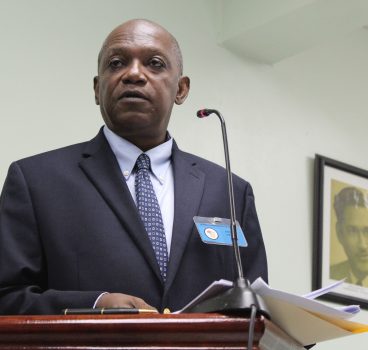Guyana Reparations Committee Chairman Dr Eric Phillips yesterday sought to make a case for 15,000 square miles of Guyana’s lands to be given to the descendants of enslaved Africans as reparations.
The basis of Phillips’ argument during his appearance before the ancestral lands commission of inquiry was that the enslaved Africans had toiled to make Guyana an economically-viable state and, making reference to the Amerindians’ receipt of 13.8% of land through the Amerindian Act of 2006, he asserted that that legislation formed a precedent for the payment of reparations.
“During enslavement for over 200 years, the tortured, murdered, raped, brutalised Africans built Guyana. No other group and I repeat, no other group—Amerindians, Indians, Portugese, or Chinese—did 1/1000th of what Africans have done; probably [not] one millionth of what they’ve done because we died, 473, 000, and they didn’t,” Phillips stated.

“Listen to the report of the then commission which was done by the British: They, the Africans have driven back the sea and have cleared, drained and reclaimed 15,000 square miles of forests and swamps. This is equivalent of nine million acres of land. In short, all the fields on which the sugar estates are based were cleared, drained and irrigated by African labour forces. In the process of building these plantations, careful research has shown that Africans installed the following: 2.58 million miles of drainage canals, trenches and inter-bed drains; 3,500 miles of dams, roads and footpaths; and 2,176 miles of sea and river defence. No one else in Guyana has done that, yet they’ve gotten reparations,” he added.
Phillips asserted that according to historical facts, the descendants of enslaved Africans are due land justice in the same manner that the nine Amerindian tribes received theirs through the Amerindian Act of 2006.
“In essence, we’re arguing that a precedence has been set and that the Amerindian Act of 2006 is a land reparatory justice act,” Phillips said.
Phillips argued that the descendants of enslaved Africans have been racially discriminated against as far as land justice is concerned, noting again that the Amerindians were granted land and financial reparations through the Act.
“…Our Amerindian leaders, if they’re honest, know that the Amerindian Act of 2006 was an act that gave them reparations. Africans were here in Guyana before three of the Amerindian tribes who were given lands in the Amerindian Act of 2006. That is unjust,” he declared. Phillips said that he fully supports the Amerindians’ rights to receive land as reparations, but when asked by Commissioner David James whether he stood behind his statement that they do not deserve an additional 10%, Phillips said he saw the claim as unjust, unfair and pernicious. Saying such, he added that the Amerindian population was only 10% of the country’s population at the time, that they had not been victims of genocide (he said that was the case in Latin America but not Guyana), and opined that they were not involved in making Guyana an economically-viable state.
He later stated that for the government of Britain or Guyana to not want to provide reparations for a crime against humanity, for which there is precedence in the Amerindian Act, is also a crime. “Therefore commissioners, the Guyana Reparations Committee claims 18% of Guyana. The 15,000 square miles we dug, we died for, we were raped for; we were murdered for. We claim that as reparatory justice,” he said.
It was Phillips’ contention that because reparatory justice has not been provided to descendants of enslaved Africans by the government, the group has been disadvantaged and does not enjoy equal rights.
In his recommendations, Phillips said that the lands should be trustee lands, to avoid the inevitable problems that would arise in future, if it were spilt into plots, as growth of the population has to be considered.
He also stated that the property should be used as collateral to place individuals into areas of enterprise, and that a financial instrument similar to the Amerindian Development Fund should be established.
Phillips also suggested that the committee recommend an African Ancestral Rights bill that mirrors the Amerindian Act, but is tailored to consider the “crime against humanity” that has been committed.
The commission’s mandate is to examine and make recommendations to resolve all the issues and uncertainties surrounding the individual joint or communal ownership of land acquired by freed African; claims of Amerindian land titling and other matters relative to land titling.
The Commission is being chaired by Reverend George Chuck-a-Sang, with James, Professor Rudolph James, Lennox Caleb, Berlinda Persaud, Carol Khan-James and Paulette Henry serving as commissioners.




